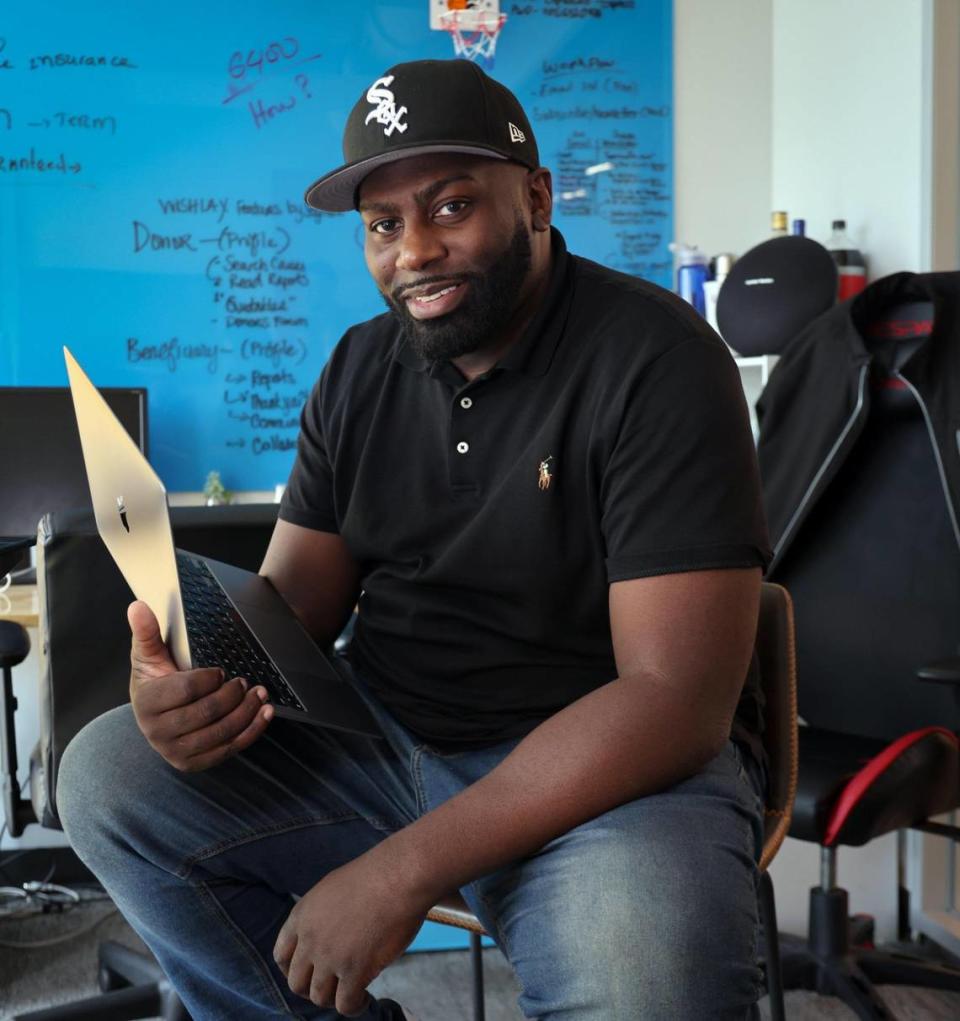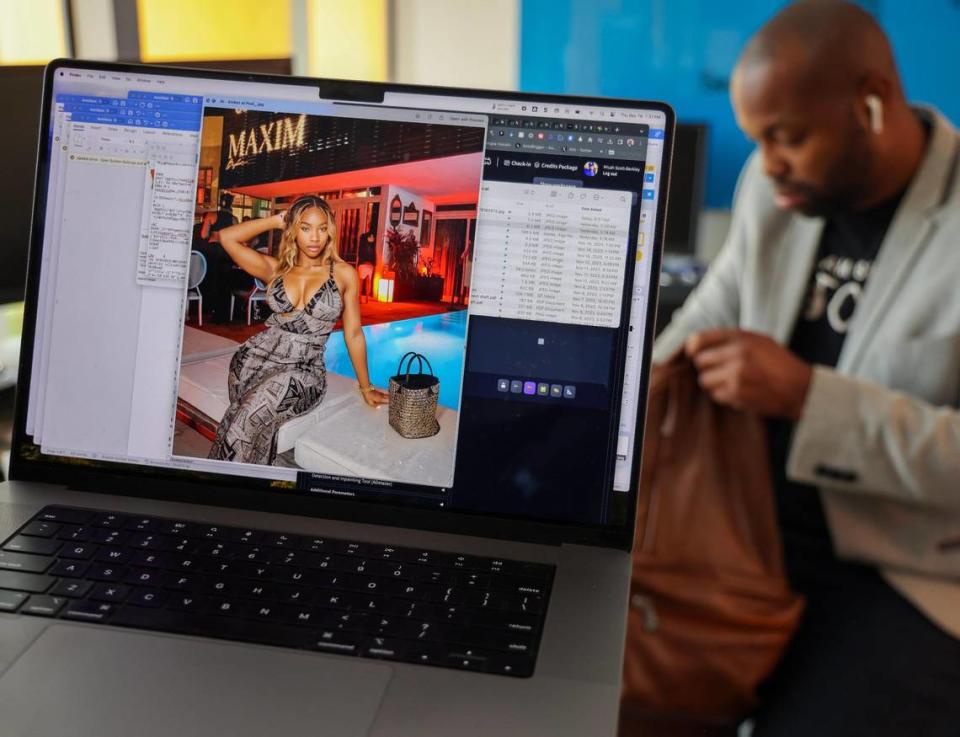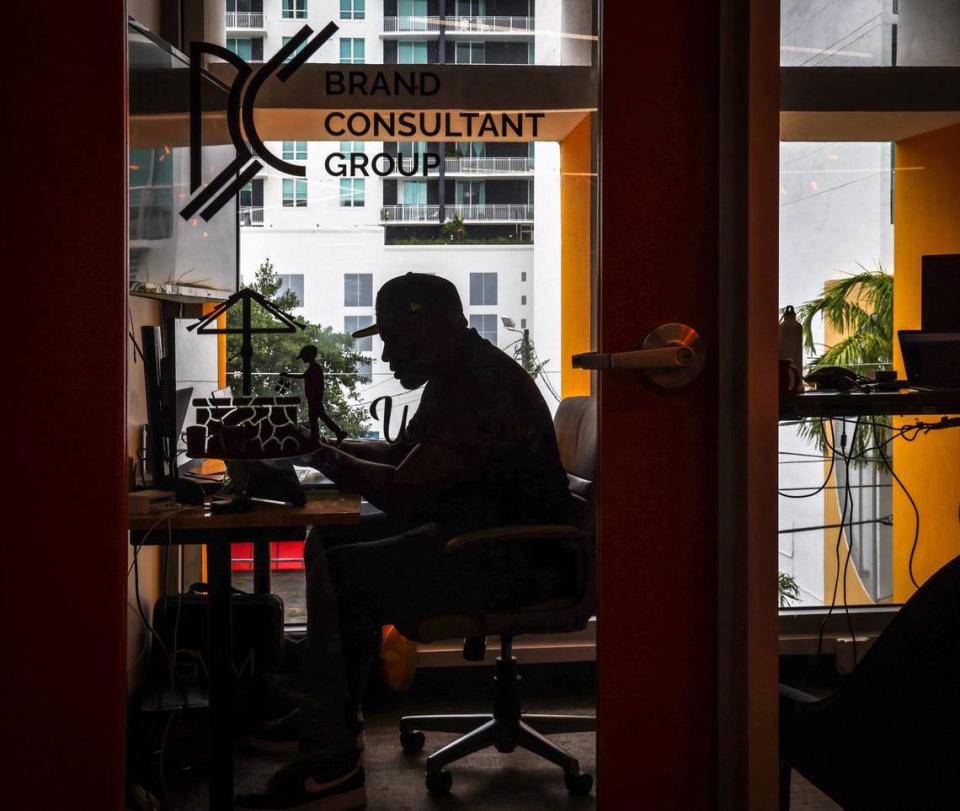‘We could do this:’ Black entrepreneur blazes a path with AI, hopes others will follow
As he taps on an Apple MacBook at his Edgewater workspace with a diamond bracelet on his right wrist and a smile on his face, it’s clear that technologist Micah Berkley is on a mission.
Dressed in a crispy black Chicago White Sox fitted cap with a matching black Ralph Lauren Polo shirt and black-and-white Nike Air Force Ones, Berkley, 39, carries himself like a man who can make $300 in less than 30 minutes.
With the way he uses artificial intelligence, his services may be even more valuable.
“I want people to understand how powerful AI is because there’s no reason why we need to be broke anymore,” he said. “I don’t want my people to be broke. We could do this. You could send a company an email saying you want to do photos for the rest of the items in their store and that you can almost guarantee a 50% increase in sales. It would cost $300.”
During a recent UberEats experience with a Wynwood restaurant, Berkley noticed that the restaurant’s menu did not have pictures of its food on the app. He reached out to its management and asked if he could create 50 photos for its menu. Surprised, the restaurant manager agreed and paid him $400.
By using AI image generator Midjourney, he created 50 images of the restaurant’s dishes in less than a 24 hours. Two weeks later, the manager called Berkley because the restaurant’s profits were up 25%.

He’s a creator but wants to be an educator, too
A native of the Bronx, New York, Berkley, moved to Miami in March 2022 from Chicago. The Brown University graduate worked as a data scientist and in other tech roles for more than a decade and always had an interest in entrepreneurship. Seeing how he and people around him were deceived or lost money to multi-level marketing schemes motivated him to find a better way of helping others build their business acumen.
Berkeley attributes the fear people sometimes have of AI to a societal disregard for science and likens it to the rise of former President Donald Trump. A similar disregard of logic is a reason why he believes people fear using artificial intelligence as a tool.
“Donald Trump was such a popular person because he targeted uneducated people,” he said. “His audience is mostly uneducated whites and Blacks. About 80% of his audience is non-college educated. When those people hear about AI, they think this is going to take our jobs. No, AI is here to be a force multiplier. It turns you from Mighty Mouse to Superman.”
The application ChatGPT allows users to type in words and phrases that generate artificially-generated language using them. For people who do not want to spend time writing, the application is a time-saving tool and allows them to maximize their output.
Taking things a step further, Berkley uses the information generated in ChatGPT as language to put into apps like Midjourney, a generative AI program that creates art based on the language that goes into it.
Using No Code software and AI image generator Stable Diffusion, Berkley has found a way to create human-like avatars that can have different backgrounds based on the prompts he enters.
Through the tool he created, his computer can detect his hand movements and create images based upon them. His prompts can create any human figure according to what he enters and and he can manipulate the figures to use his gestures and movements.
Using this strategy, Berkley uses AI to create human-like avatars that have their own social media profiles and can be used for marketing purposes. Clothing can be superimposed on the avatars and branded products can be placed in their images. Berkley effectively owns his creations and can utilize them in brand partnerships.
What about intellectual property rights?
The use of AI to create profitable works of art is a hotly debated topic. An AI-generated song using the vocal likeness of Drake and The Weeknd was denied a Grammy nomination because while another human being named Ghostwriter wrote the song, the two pop stars’ vocal likenesses were used without their permission.
Lawyer Somara Jacques is based in downtown Miami and uses AI tools like ChatGPT. She said she believes that transparency is important for entrepreneurs who want to use AI for their businesses.
According to Jacques, 39, using AI models to represent yourself in public can become fraud if you’re presenting yourself as a real human through the model and people are giving you money. There is a fine line between using AI to create an avatar or character for marketing purposes and using it to represent yourself, she said.
“I’m not deterring people from using AI,” she said. “It’s expensive to run a business if you’re a sole proprietor. With AI art, you can go to Photoshop and change things around. If it’s transformative enough it’s your own work. That’s where the argument comes in.”
Jacques is concerned about the capacity for copyright infringement that comes with using AI-generated art. AI art generators pull data from the entire internet when they respond to prompts and users run the risk of creating art with noticeable influences of copyrighted work.
“Finding someone symmetrical and generally pretty for [an image] happens, but we don’t know how much the user altered it. If you create this by hand and generate it manually, you have better control over it. If it’s AI-generated, you don’t.”

AI is a tool that can create opportunities
Carl M. Szabo, 42, is the vice president of NetChoice, a free trade organization that advocates for internet safety and free enterprise. Szabo took time before his panel at the recent South Florida Innovation Day at Fort Lauderdale’s Nova Southeastern University, to discuss how AI can be a tool for people of all backgrounds to use.
“[We are] trying to explain that there are some simple ways that you can actually use AI to make your life better,” he said. “Generative AI has been around for quite a while. I’ve actually given presentations to community centers and to elderly groups and I will have the screen up and I’ll just go through some examples and I’ll ask questions.”
Still, AI-generated content can only be as polished as the attention it receives from its user, Szabo said.
“I analogize it to asking an intern to do the first draft or take a first crack at something,” he added. “You’re never going to take what an intern gives you and just run with it. You’re going to have to scrutinize it.”
As Berkley works between his MacBook and the large screen in front of him, the fun he has working with artificial intelligence is evident. He said he believes in how education on AI can create opportunities for others.
“A lot of people don’t even have the resources to talk to people about this,” he said. “Once you show it to them, their minds open up immensely.”


